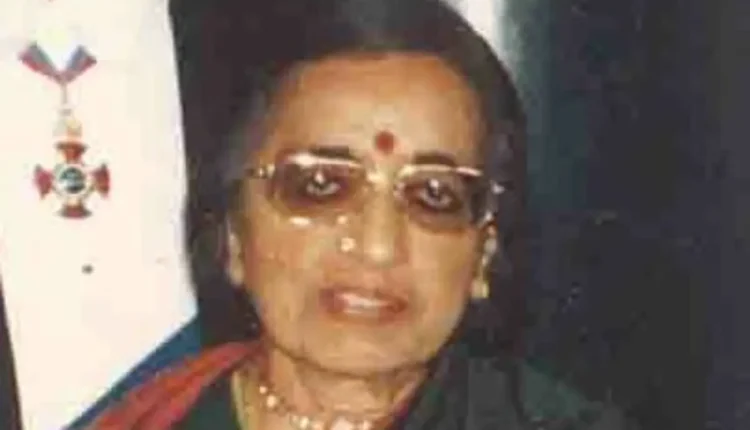In the vast chronicles of India’s history, Janaki Venkataraman’s legacy as First Lady and social activist holds a unique place. She was a woman who saw beyond ceremonial duties and ventured boldly into humanitarian work, creating an impact that still resonates today. From her quiet resilience as the wife of Indian President R. Venkataraman to her vocal advocacy for women’s rights, Janaki’s life remains an inspiration, filled with integrity, commitment, and compassion.
Early Life of Janaki Venkataraman: A Journey from Burma to India
Born in 1921 in Pegu, Burma (now Bago, Myanmar), Janaki Venkataraman was the daughter of Tamil Iyer Burmese Indian parents. The untimely death of her mother when Janaki was just five years old thrust her into the role of caretaker, helping her family in household responsibilities.
This early exposure to challenges shaped her character, instilling resilience, humility, and a sense of responsibility. Although her father did not remarry, the close-knit family’s bond grew stronger, and Janaki’s commitment to family values and her Tamil heritage became integral parts of her identity.
In 1938, Janaki Venkataraman married R. Venkataraman, a young lawyer whose dedication to social justice and labor rights soon catapulted him into the political arena. Her husband’s growing involvement in politics and union activism introduced Janaki to the broader landscape of India’s social struggles, where she found her own calling. Her role was not limited to that of a supportive spouse; she became his active partner in initiatives such as the Labor Law Journal, a pioneering publication dedicated to workers’ rights and labor reforms.
Championing Human Rights and Women’s Rights
Janaki Venkataraman’s journey as an activist was rooted in her profound empathy and commitment to justice. She became an ardent advocate for women’s rights, a cause that gained urgency during the 1971 Bangladesh Liberation War, which witnessed unspeakable violence against women.
Moved by their plight, Janaki Venkataraman led large-scale protests, standing up for the survivors of wartime atrocities and advocating for justice and dignity. Her ability to mobilize “hundreds of supporters” reflected her leadership and deep-rooted empathy toward vulnerable communities. Her voice carried the weight of conviction, inspiring countless others to join her in advocating for women’s safety and autonomy.
Her activism wasn’t restricted to women’s rights. Janaki Venkataraman also promoted women’s self-reliance, urging them to seek financial independence as a means of empowerment. As a first lady with immense influence, she dedicated her platform to address issues that affected millions, striving to uplift marginalized communities and offering a message of hope and solidarity.
The Vision of Ahimsa Silk and Animal Rights Advocacy
Janaki’s advocacy for animal rights was another chapter in her life of compassion. Known for her dedication to ethical principles, she made the remarkable choice to avoid silk fabrics produced through traditional methods, which require the killing of silkworms. Instead, she championed Ahimsa Silk, a revolutionary form of “vegan silk” crafted without harming the silkworms. This decision was both symbolic and influential, reflecting her commitment to ahimsa (non-violence) and reverence for all forms of life.
The impact of Janaki’s support for Ahimsa Silk went beyond personal choice—it led to a nationwide movement. Through her influence, Ahimsa Silk, also known as mulberry silk, gained popularity and soon became a staple in the wardrobes of ethical consumers.
Her unwavering support sparked an entrepreneurial boom, with artisans and designers working to develop sustainable silk production techniques. Today, her influence remains evident, as many fashion houses and silk producers prioritize cruelty-free and eco-friendly practices, thanks to the awareness Janaki helped create.
A Quiet yet Resilient First Lady
Janaki Venkataraman’s role as First Lady from 1987 to 1992 was a delicate balance of tradition and change. As India’s first foreign-born First Lady, Janaki’s unique background brought a fresh perspective to her position. She accompanied President R. Venkataraman on numerous diplomatic visits, representing Indian womanhood and embodying grace, intelligence, and quiet strength.
Despite her visibility in the public sphere, Janaki was careful not to be in the limelight unnecessarily. When a documentary about her husband’s life included only a single image of her, she requested its removal, famously remarking that she would rather “be noticed in the absence than to be ignored as an insignificant presence.” This simple yet profound statement reveals her approach to public life—humble, dignified, and focused on meaningful contributions rather than superficial recognition.
Social Welfare and Advocacy as First Lady
During her tenure as First Lady, Janaki Venkataraman dedicated herself to social welfare initiatives. Leveraging her influence, she directed resources from the President’s office toward community programs, particularly those focused on women’s education, health, and economic independence. Janaki’s efforts helped establish sustainable support systems for underprivileged communities and provided critical resources for women aiming to improve their circumstances.
Under her leadership, several initiatives were launched to provide women with vocational training, micro-financing options, and healthcare access, particularly maternal care. These programs empowered countless women, giving them the confidence and means to transform their lives. Her focus on sustainable change over short-term assistance was a testament to her understanding of empowerment and her commitment to leaving a lasting impact.
Legacy and Passing
Janaki Venkataraman passed away on 13 August 2010, leaving behind a legacy woven with integrity, compassion, and visionary activism. Though she outlived her husband by a year and a half, her life remained inseparable from his, as together they had shaped a significant chapter of India’s history. Janaki’s legacy endures through her three daughters and the countless lives she touched.
Her contributions to human rights, animal welfare, and women’s empowerment reflect a life devoted to the values of dharma (duty), ahimsa, and compassion. Janaki Venkataraman’s story serves as a reminder of the power of quiet resilience, ethical choices, and the profound impact one individual can have in championing social change.
Also Read:David Oliver Abel: Pioneer of Economic Reform in Myanmar’s Military Leadership

